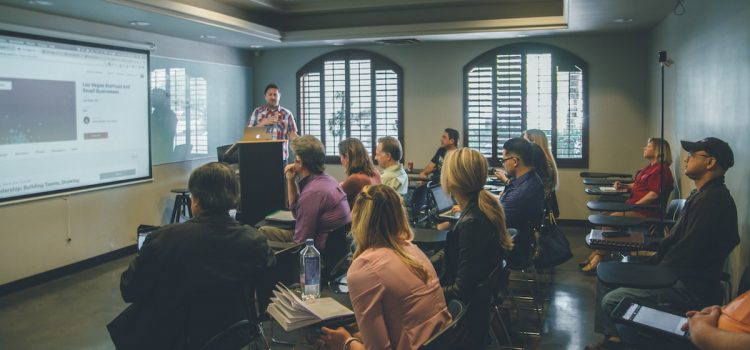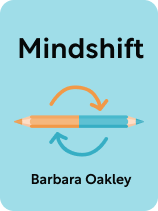

This article is an excerpt from the Shortform book guide to "Mindshift" by Barbara Oakley. Shortform has the world's best summaries and analyses of books you should be reading.
Like this article? Sign up for a free trial here.
What’s standing in the way of you going back to school? Would you like to learn something new but aren’t sure how to go about it?
Many people sense the need for a career change, but they don’t know where to start when it comes to getting the education they need to make that happen. In Mindshift, Oakley writes that it’s possible to overcome perceived barriers and gain new skills so you can reinvent yourself.
Read more to learn about several challenges of adult education and how to overcome them.
4 Challenges of Adult Education
Oakley has specific advice for overcoming common perceived barriers to learning new skills: thinking you’re too old, being a slow learner, feeling like an imposter, and not having enough time or money. Let’s take a look at each of these challenges of adult education and Oakley’s tips for meeting them head-on.
#1: Advanced Age
As we age, our brains deteriorate, with neurons (brain cells) naturally dying off and synapses (the connections between neurons that lead to memory formation) decreasing. This decrease in neurons and synapses makes it harder for us to remember things and learn new information. However, Oakley says there are research-backed ways to help generate new neurons and synapses to facilitate learning, no matter how old you are.
(Shortform note: Though Oakley says that neurogenesis is possible in adults, there’s still a lot of debate about this among neuroscientists. For example, one study suggests that adults well past middle age continue to generate new neurons, but some scientists dispute this, arguing that these neurons have been around since childhood.)
In particular, Oakley recommends two methods:
1. Exercise. While it isn’t a panacea for brain aging, exercise leads to the production of a powerful protein called brain-derived neurotrophic factor (BDNF). Oakley explains that BDNF protects neurons and synapses (preventing them from deteriorating) and boosts our cognitive functions, including our ability to retain long-term memories.
(Shortform note: Exercise doesn’t just supercharge your brain by producing BDNF. It also makes you more alert and attentive, which primes you for learning, and helps you manage mental health issues such as stress and anxiety that can derail your learning.)
2. Give your mind a regular workout too. Oakley writes that when you challenge your brain by doing or learning something new each day, you encourage neurons to grow and fortify their connections to one another. You can challenge your brain by taking up a hobby, learning a new language, or even performing a simple task like using your non-dominant hand when you brush your teeth. Such challenges create a virtuous learning cycle: They keep your brain from deteriorating, which then allows you to learn even more new things, which further keeps your brain from deteriorating.
(Shortform note: Oakley writes that giving your brain both big and small daily challenges can keep it in peak condition. In particular, she suggests learning a new language, which experts agree is beneficial to the brain—people who speak more than one language tend to be more cognitively agile, have better memories, and may even have bigger brains. Oakley’s other suggestion to brush your teeth using your non-dominant hand may strengthen synapses, but some experts warn that forcing children to switch to their non-dominant hand may lead to an increased risk of schizotypy, a condition that keeps them from forming close relationships.)
#2: Feeling Like or Being a Slow Learner
This barrier can manifest in two ways: You might grasp concepts more slowly than your peers, or you might believe you’re a slow learner because your way of learning differs from schools’ traditional methods of teaching.
If you’re a slow learner who takes more time to understand concepts compared to your peers, the following tips can help you manage:
1. Be prepared. Find out what you’ll be learning in class in advance so you can get familiar with the material and get a headstart on understanding it.
(Shortform note: If you’re learning outside a classroom setting through a mentor, prepare for your mentorship meetings so that you don’t waste your mentor’s time. Be proactive by telling your mentor what your objectives are so that they can tailor their support to your needs, and come up with a list of topics or questions and send them to your mentor ahead of your meeting.)
2. Use idle time to learn. Keep your books or notes with you at all times so you can go through them during pockets of free time, like while you’re waiting in line at the coffee shop or on your train ride home from work.
(Shortform note: Modern society seems to prize busyness and filling every spare second with activity and associates idleness with laziness. But some argue that allowing yourself to be bored can be a good thing because it can improve your creativity.)
3. Improve your memory. Memorization is a key component of understanding and applying ideas—being able to retain several concepts in your head enables you to solve problems more quickly and connect ideas in creative ways. Oakley thus recommends improving your memory with memory practice.
(Shortform note: Scott Young has three strategies for improving your memory in Ultralearning: 1) Test yourself right after you read something by putting the material away and writing down everything you can remember, 2) overlearn something by practicing it repeatedly until it becomes automatic, and 3) use spaced repetition, which means spreading out practice sessions over a period of time.)
If, on the other hand, you just believe you’re a slow learner because you have trouble keeping up with lectures and textbooks, try using visual tools to help you better understand concepts. Oakley gives the example of an unconventional learner who would sketch mind maps to help him retain information.
(Shortform note: Visual tools like mind maps aid in learning because the human brain is naturally better at remembering images and places than it is at remembering lists of numbers and words. In Moonwalking With Einstein, Joshua Foer gives guidelines for creating a kind of mind map called a memory palace: Turn information into images and mentally put each image into a place you’re intimately familiar with (your palace)—this can be your home, your dog-walking route, or any other place that has a sequential progression. For example, if you want to remember a to-do list that has “pick up dry cleaning, balance checkbook, call Mom,” you can picture your clothes in your foyer, a checkbook on your sofa, and your mom in the kitchen.)
#3: Feeling Like an Imposter
The third barrier to learning new skills is imposter syndrome—doubting your abilities, feeling like a fraud, and attributing your accomplishments to factors other than your skills and hard work. Imposter syndrome makes you anxious about taking risks and trying something new.
(Shortform note: One expert says imposter syndrome manifests in a number of ways: believing you have to make up for a lack in skill by working extra hard, feeling undeserving of your accomplishments, being afraid that others will find out that you don’t know what you’re doing—which prevents you from asking for help when you need it.)
Oakley says that those who feel imposter syndrome tend to be high achievers or women, many of whom are brought up to think that being modest about their accomplishments is a desirable trait.
(Shortform note: In Lean In, Sheryl Sandberg presents proof of Oakley’s assertion, citing studies wherein women rated their performances lower than men rated themselves. Sandberg writes that one reason this happens is that women tend to take negative feedback harder, which affects their self-confidence.)
When you question whether you’re capable of doing something—like making a big career change—think objectively about where that self-doubt is coming from. Reflect on your experiences and assess the strengths that led to your successes. Once you realize that you’re responsible for your achievements, you’ll gain the confidence that will help you tune out negative self-talk and propel you forward in your next phase.
(Shortform note: Aside from being more self-aware and avoiding negative self-talk, you can also manage imposter syndrome with some tips from the American Psychological Association. First, talk about your feelings with supportive, trustworthy people, preferably outside of work. Second, talk about your failures—others are more likely to open up about their struggles if you discuss yours. And third, accept praise from others and display physical reminders of your accomplishments (such as awards) where you can constantly see them.)
#4: Not Having the Time or Money
Going back to school to earn a degree (or another one) can open new doors, but for many, the time and financial commitment may be prohibitive.
(Shortform note: One major consideration is whether you would be a part-time or full-time student, both of which have their pros and cons. But even if you can manage your time well enough, is it worth the expense? If you’re thinking of earning a degree in the hopes of getting a higher-paying job, consider the numbers: One report states that most people get their college investment back within 10 years or less after graduation, but around 25% don’t earn it back even after 20 years. To give you a rough idea of your potential return on investment, compute a degree’s Price-to-Earnings Premium. If you’re aiming for an advanced degree, you can get an estimate of your debt-to-income ratio two years after graduation here.)
Oakley has the following tips to get around this obstacle:
1. Get a mentor. According to Oakley, mentors can bring value to both your work and your personal life. You can benefit from having two mentors: One to serve as a cheerleader who encourages you to keep going, and one to give you constructive feedback and keep you accountable. Oakley adds that a person doesn’t have to be an official mentor for you to learn from them. However, if you do ask someone to be your mentor, consider what you bring to the table so that your mentor benefits from the relationship as well.
| More About Mentors While Oakley says you can benefit from having two mentors, other experts recommend having multiple mentors. This enables you to get different perspectives, gain more insights, and apply what works for you at different stages in your career. To find multiple mentors, think about where you want to be five years from now, list down what you’ll need to get there (skills, connections, technical know-how), and reflect on whether there are people in your life who can provide you with the support you need. If you’re coming up blank in some areas, you’ll need to form and nurture new relationships. Once you have a clear picture of what you need and who might be able to provide it, ask each would-be mentor if they would guide you in a specific area such as networking or career goal-setting—by narrowing the scope, you’ll reduce the likelihood that they’ll feel overburdened and increase the chances that they’ll say yes. Once you have your mentors lined up, make sure that you have a mutually beneficial relationship, as Oakley suggests. In Never Eat Alone, Keith Ferrazzi says you can give back to your mentor by being loyal to them and letting them know they can rely on you if they need support and by working hard (particularly if your mentor is a higher-up at the same company). You can also give them a thank-you gift or donate to a cause they care about. |
2. Sign up for a MOOC. MOOCs, or massive online open courses, are classes you can access through the Internet. Oakley writes that there’s a MOOC for virtually anything you want to learn, and some are even offered by prestigious universities.
(Shortform note: Since Mindshift was published in 2017, there has been increased interest in MOOCs, especially as the Covid-19 pandemic restricted in-person learning. MOOC providers saw a spike in new users; for instance, Coursera, the top MOOC provider, more than doubled their new users, going from 8 million in 2019 to 20 million in 2020.)
One advantage of taking online classes is they’re free or significantly cheaper than enrolling in an in-person course. Other advantages include flexibility since you can watch the recorded lessons on your own time, and networking, since you take classes with students from around the world. You also don’t have to limit yourself to one area of study—Oakley says some people take a dozen or more MOOCs at a time to obtain the equivalent of an advanced degree.
Oakley cautions that there are also disadvantages to MOOCs: Being fully in control of your learning means you might waste time taking classes you don’t need. You should be disciplined enough to make time for the classes and the coursework—no one else is going to push you to do so. Additionally, MOOCs typically don’t give you a recognized degree, even if you do gain equivalent knowledge. And while MOOCs allow you to connect with fellow students, the online environment doesn’t give you the same kind of interaction you would get from an in-person classroom experience.
Exercise: Overcome the Challenges
Perceived barriers can discourage people from making a change. Be more aware of your barriers and come up with a plan to overcome them.
- Recall the four barriers: being a slow learner, advanced age, imposter syndrome, and lack of time or money. Which of these is preventing you from making a change in your life?
- What’s one thing you can do right away to help you get over this barrier? For example, if your barrier is advanced age, make an exercise plan. If your barrier is a lack of money, look for MOOCs that are free or within your budget.

———End of Preview———
Like what you just read? Read the rest of the world's best book summary and analysis of Barbara Oakley's "Mindshift" at Shortform.
Here's what you'll find in our full Mindshift summary:
- That it's never too late to make a career change
- How to overcome the mental barriers that hold you back
- Why career shifts are essential in the fast-changing world






